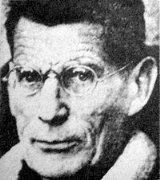
novelist, playwright
, theatre director, and poet
. He wrote both in English and French. His work offers a bleak, tragicomic
outlook on human nature, often coupled with black comedy
and gallows humour
.
Beckett is widely regarded as among the most influential writers of the 20th century. Strongly influenced by James Joyce
, he is considered one of the last modernists
.
If by Godot I had meant God I would have said God, and not Godot.![]()
It means what it says.![]()
I grow gnomic. It is the last phase.![]()
I think the next little bit of excitement is flying. I hope I am not too old to take it up seriously, nor too stupid about machines to qualify as a commercial pilot. I do not feel like spending the rest of my life writing books that no one will read. It is not as though I wanted to write them.![]()
We are no longer the same, you wiser but not sadder, and I sadder but not wiser, for wiser I could hardly become without grave personal inconvenience, whereas sorrow is a thing you can keep adding to all your life long, is it not, like a stamp or an egg collection, without feeling very much the worse for it, is it not.![]()
For the only way one can speak of nothing is to speak of it as though it were something, just as the only way one can speak of God is to speak of him as though he were a man, which to be sure he was, in a sense, for a time, and as the only way one can speak of man, even our anthropologists have realized that, is to speak of him as though he were a termite.![]()
But he had turned, little by little, a disturbance into words, he had made a pillow of old words, for his head.![]()
But he had hardly felt the absurdity of those things, on the one hand, and the necessity of those others, on the other (for it is rare that the feeling of absurdity is not followed by the feeling of necessity), when he felt the absurdity of those things of which he had just felt the necessity (for it is rare that the feeling of necessity is not followed by the feeling of absurdity).![]()

